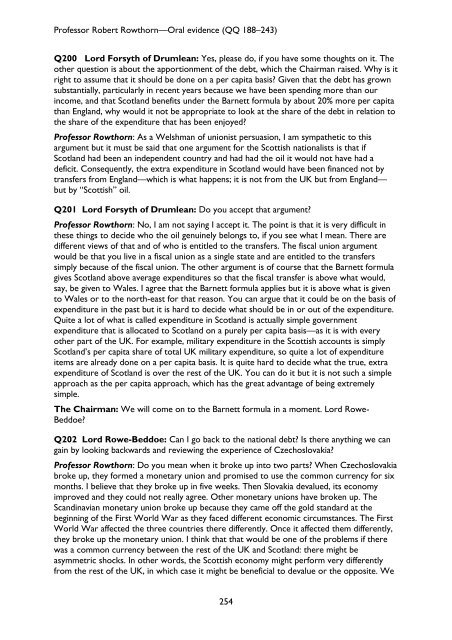SELECT COMMITTEE ON ECONOMIC AFFAIRS - Parliament
SELECT COMMITTEE ON ECONOMIC AFFAIRS - Parliament
SELECT COMMITTEE ON ECONOMIC AFFAIRS - Parliament
Create successful ePaper yourself
Turn your PDF publications into a flip-book with our unique Google optimized e-Paper software.
Professor Robert Rowthorn—Oral evidence (QQ 188–243)<br />
Q200 Lord Forsyth of Drumlean: Yes, please do, if you have some thoughts on it. The<br />
other question is about the apportionment of the debt, which the Chairman raised. Why is it<br />
right to assume that it should be done on a per capita basis? Given that the debt has grown<br />
substantially, particularly in recent years because we have been spending more than our<br />
income, and that Scotland benefits under the Barnett formula by about 20% more per capita<br />
than England, why would it not be appropriate to look at the share of the debt in relation to<br />
the share of the expenditure that has been enjoyed?<br />
Professor Rowthorn: As a Welshman of unionist persuasion, I am sympathetic to this<br />
argument but it must be said that one argument for the Scottish nationalists is that if<br />
Scotland had been an independent country and had had the oil it would not have had a<br />
deficit. Consequently, the extra expenditure in Scotland would have been financed not by<br />
transfers from England—which is what happens; it is not from the UK but from England—<br />
but by “Scottish” oil.<br />
Q201 Lord Forsyth of Drumlean: Do you accept that argument?<br />
Professor Rowthorn: No, I am not saying I accept it. The point is that it is very difficult in<br />
these things to decide who the oil genuinely belongs to, if you see what I mean. There are<br />
different views of that and of who is entitled to the transfers. The fiscal union argument<br />
would be that you live in a fiscal union as a single state and are entitled to the transfers<br />
simply because of the fiscal union. The other argument is of course that the Barnett formula<br />
gives Scotland above average expenditures so that the fiscal transfer is above what would,<br />
say, be given to Wales. I agree that the Barnett formula applies but it is above what is given<br />
to Wales or to the north-east for that reason. You can argue that it could be on the basis of<br />
expenditure in the past but it is hard to decide what should be in or out of the expenditure.<br />
Quite a lot of what is called expenditure in Scotland is actually simple government<br />
expenditure that is allocated to Scotland on a purely per capita basis—as it is with every<br />
other part of the UK. For example, military expenditure in the Scottish accounts is simply<br />
Scotland’s per capita share of total UK military expenditure, so quite a lot of expenditure<br />
items are already done on a per capita basis. It is quite hard to decide what the true, extra<br />
expenditure of Scotland is over the rest of the UK. You can do it but it is not such a simple<br />
approach as the per capita approach, which has the great advantage of being extremely<br />
simple.<br />
The Chairman: We will come on to the Barnett formula in a moment. Lord Rowe-<br />
Beddoe?<br />
Q202 Lord Rowe-Beddoe: Can I go back to the national debt? Is there anything we can<br />
gain by looking backwards and reviewing the experience of Czechoslovakia?<br />
Professor Rowthorn: Do you mean when it broke up into two parts? When Czechoslovakia<br />
broke up, they formed a monetary union and promised to use the common currency for six<br />
months. I believe that they broke up in five weeks. Then Slovakia devalued, its economy<br />
improved and they could not really agree. Other monetary unions have broken up. The<br />
Scandinavian monetary union broke up because they came off the gold standard at the<br />
beginning of the First World War as they faced different economic circumstances. The First<br />
World War affected the three countries there differently. Once it affected them differently,<br />
they broke up the monetary union. I think that that would be one of the problems if there<br />
was a common currency between the rest of the UK and Scotland: there might be<br />
asymmetric shocks. In other words, the Scottish economy might perform very differently<br />
from the rest of the UK, in which case it might be beneficial to devalue or the opposite. We<br />
254

















